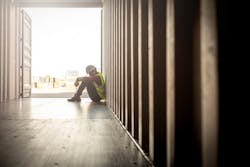The year 2019 was a great one for home builders. Home builder confidence hit a 20-year high, with home building activity at a record-breaking 13-year high. The SPDR S&P Homebuilders ETF index rose by 28%, and buyer demand soared through even the traditionally slower holiday season. Plus, industry experts and media pundits alike were abuzz with forecasts of another banner year in 2020.
Then, out of left field, came March 2020. COVID-19 descended and it had an impact across every facet of our lives, and for far longer than anyone could have predicted, as it is still continuing to shape every decision.
RELATED
- Lennon, Lincoln, and Leadership
- Home Builders Reconsider Remote Work Options
- Climbing Out of Covid-19 With Culture
Catalytic Disruption as COVID-19 Becomes a Mainstay of 2020
COVID-19 accelerated disruption in home building, an industry that has traditionally been slow to embrace change, relying on tried-and-true methods like in-person appointments and paper-heavy trails of contracts to execute the majority of the homebuying process. The home building industry was presented with a number of challenges and little time to adapt.
All of a sudden, digital communication became essential for every interaction, forcing home builders to swiftly accelerate the adoption curve.
An immediate and apparent challenge stemming from COVID-19 was the enactment of stay-at-home orders, which immediately halted some of the most elemental interactions between builders and potential buyers. Moreover, it brought a cloud of uncertainty over the housing market and economic climate. Potential buyers began to revisit their plans and budgets, contemplating rainy day funds and lifestyle changes. Ultimately, some put buying plans on hold indefinitely.
To keep up with demand and adapt to social distancing guidelines, leading home builders boosted their virtual offerings in a matter of weeks, quickly shifting to contactless, appointment only, or virtual tours.
On the other hand, stay-at-home orders provided many opportunities for contemplation. Low interest rates and move-in specials encouraged renters to explore purchasing a home of their own, and enticed move-up buyers to opt for a bigger home with more space. According to Redfin, homebuying demand began increasing in mid-April and surpassed pre-pandemic levels by a whopping 25% in June.
In order to keep up with demand and adapt to social distancing guidelines, leading home builders boosted their virtual offerings in a matter of weeks, quickly shifting to contactless, appointment only, or virtual tours across the nation. In tandem, sales centers developed rigorous health and safety measures aimed at protect their employees and prospective buyers. We at Meritage Homes were one of the first to go-to-market with a comprehensive end-to-end virtual homebuying solution, introducing a five-step digital suite of tools to help prospective homebuyers seamlessly continue their search, purchase, and close on a home:
- Research and get helpful resources, browse communities, and shop for homes online with the ability to view virtual tours and interactive maps, leverage online payment calculators, and more.
- Connect with a live Meritage representative, via chat, email, or phone to get your questions answered or to schedule a private in-home tour or personal virtual tour
- Find the home of your dreams by working with a sales counselor to tour homes virtually and find the perfect fit.
- Purchase your home using digital tools to get pre-approved, sign the contract, and even visit the design center virtually
- Move in to your new home after completing a virtual closing and attending your new home orientation online.
Since implementing the virtual homebuying process at the end of March, we’ve seen almost 20% of our buyers start their homebuying experience from the comfort of their couch. Their swift interest in leveraging these new digital tools underscores the necessity-driven demand for these types of solutions in today’s world. Our design centers, model homes, and sales centers are now open with health and safety measures in place, but virtual options continue to be of interest to many consumers, who appreciate the added safety and convenience the digital process brings.
The Post-Pandemic Impact of Industry Shifts to Digital
Virtual homebuying solutions are more than just a COVID-19 workaround. In-person model home tours, sales office appointments, and community opening events will continue trickling back in post-pandemic, but the viability of this new digital-focused business model will continue to prove valuable.
Housing trends will continue to vary in coming years. Right now, many city dwellers are finding some appeal in moving to the suburbs for fresh air and extra space, accommodating stay-at-home lifestyles, for instance, and more renters are contemplating purchasing a home, as mortgage rates are at record lows. Floor plans with flex rooms and spaces have heightened demand, as homes transform into our schools, offices, and gyms. With the increase of unemployment and uncertainty stemming from the pandemic, more families are considering multigenerational living, citing affordability and convenience. Depending on the landscape in years to come, these preferences may change, but the use of digital communication resulting from the pandemic will fundamentally and permanently shape the housing industry’s business model, as virtual homebuying solutions become expected alternatives for consumers post-pandemic.
Floor plans with flex rooms and spaces have heightened demand, as homes transform into our schools, offices, and gyms.
We can envision these options continuing to evolve and become more robust, as they rise beyond a critical essential for interactions. Offering customers and home builders more options to connect and flexible routes to complete the comprehensive homebuying process, in-person or online, also accommodates various lifestyles for added appeal.
Quick-turn strategies during COVID-19 have included digital alternatives to replace previously in-person solutions. However, companies should look beyond these pandemic-related day-to-day demands and shape their business strategy with a heavy focus on digitized offerings for elevated experiences that supplement the traditional approach. Organizations that implement digitization will be best set up for long-term success, allowing them to increase profits, stay ahead of the competition, and prepare for any future challenges that limit in-person interactions.
Phillippe Lord has served as COO and executive vice president of Meritage Homes since April 2015. He joined Meritage in 2008 as VP of its strategic operations and market research department, which is primarily responsible for evaluation and recommendations on all land acquisitions, product placement, and pricing. He was instrumental in developing this industry-leading research and analysis group for Meritage Homes. He previously held leadership positions with Acacia Capital, Centex Homes, and Pinnacle West Capital.

